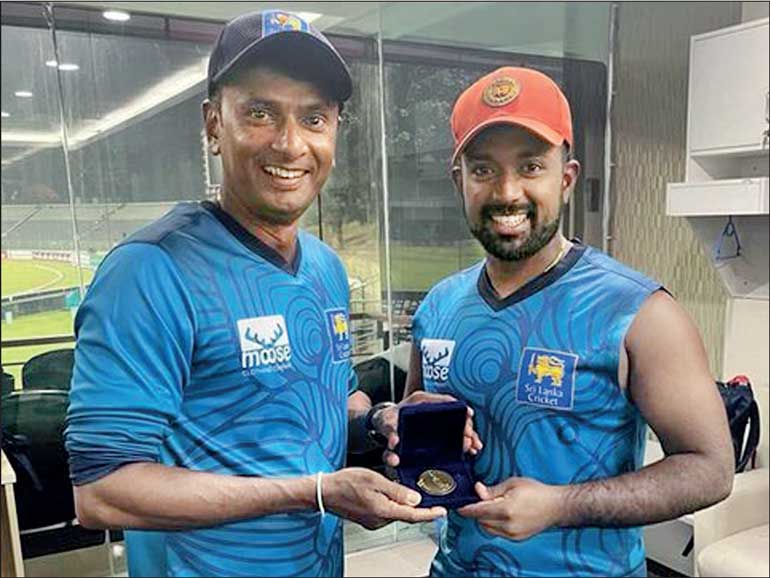Sunday Feb 22, 2026
Sunday Feb 22, 2026
Wednesday, 6 March 2024 00:30 - - {{hitsCtrl.values.hits}}

Sri Lanka fielding coach Upul Chandana presents the first orange cap and gold coin to acting captain Charith Asalanka at the end of the first T20I against Bangladesh at Sylhet on Monday
Sri Lanka’s acting T20I captain Charith Asalanka became the first holder of the orange cap and gold coin after he was adjudged the best fielder in the Sri Lanka team following their narrow three-run win over Bangladesh in the first T20I played at Sylhet on Monday.
Asalanka leading his country for the first time was head and shoulders above the rest of his team mates on the field holding onto three catches including the crucial one of Jaker Ali in the final over which sealed the match in Sri Lanka’s favour.
“It’s a new initiative where we are trying to recognise the best fielder of the match to motivate the entire team to uplift the fielding standards,” said Sri Lanka team manager Mahinda Halangoda.
“It’s not only the catches, but the ground fielding as well. We are not going to give it to the fielder who takes the highest number of catches but who will make a difference in the field, saving runs, throwing, direct hits, a run out etc. which is vital to win the game. It’s a competition amongst the team members to win the cap and gold coin. Even a reserve can win it if he is substituting for somebody on the field.”
Halangoda is one of the judges in the panel to decide the winner along with fielding coach Upul Chandana and head coach Chris Silverwood.
“The orange cap will be worn by the fielder until the next match. He can wear it at practices also, so that everybody will know that he was the best fielder,” explained Halangoda. “The gold plated coin is a big one. We are trying to get a replica of it done so that it can be kept by the player who wins it. But this one will keep rotating along with the cap from match to match.”
Halangoda said that the concept was a management decision. “Everybody actually discussed, including the coaches. We felt that it would be a good idea and Upul wanted it, that it would be a good thing to recognise them. We felt that somehow we should get it done. That’s why we initiated it.”
“We had not given much attention to fielding in the past, but now fielding is playing a big part in our wins. It really boosts and supports our bowling. At the moment it’s only for fielding we have initiated an award. It will be taken by the players and obviously we’ll look at the batting and bowling also.”
Fielding coach Upul Chandana said that he introduced this new concept some years ago when he was coach of the Sri Lanka U19 team.
“I wanted to improve the fielding standards of the U19 boys so I introduced it. I have presented the best fielders with trophies and watches which I brought with my own money, but now it is Sri Lanka Cricket who is financing this new initiative,” said Chandana.
Sri Lanka’s fielding standards which at one time was world class had fallen by the wayside in recent times that affected the win-loss ratio greatly. Following a disastrous showing at the last Cricket World Cup where Sri Lanka spilled as many as 16 catches, the highest by a team in the tournament, several changes came about with the appointment of a new selection panel and some changes to the support staff where Upul Chandana, one of the finest fielders produced by Sri Lanka was appointed fielding coach of the national team. Ever since his arrival and that of national fielding coach Anton Roux, the Sri Lankan fielding standards have shown vast improvement as was seen during the recent series against Zimbabwe, Afghanistan and in the first T20I against Bangladesh.
“If you take the % of catches held in the World Cup and now it has improved by 20%,” said Chandana. “In the World Cup, the % was 68% but as of yesterday (Monday) it has gone up to 88% which is a big improvement.”
Chandana was all praise for the way Sri Lanka fielded in Monday’s game under difficult conditions.
“If you take yesterday’s conditions under which we fielded we were in a situation where due to the heavy dew players had to handle a wet ball, and because of the wetness the ball became heavy when going for a catch or fielding or throwing. The ball travelled much faster to the boundary because the lines were short. It was a big challenge. Considering the conditions under which we played, I think the team did exceptionally well on the field. Everyone displayed remarkable energy. It is through the energy that you can lift a side. The biggest factor in the team is the energy that is oozing out. Everyone is trying to do something.”
The second T20I commences today at Sylhet with Sri Lanka leading 1-0 in the three-match series.